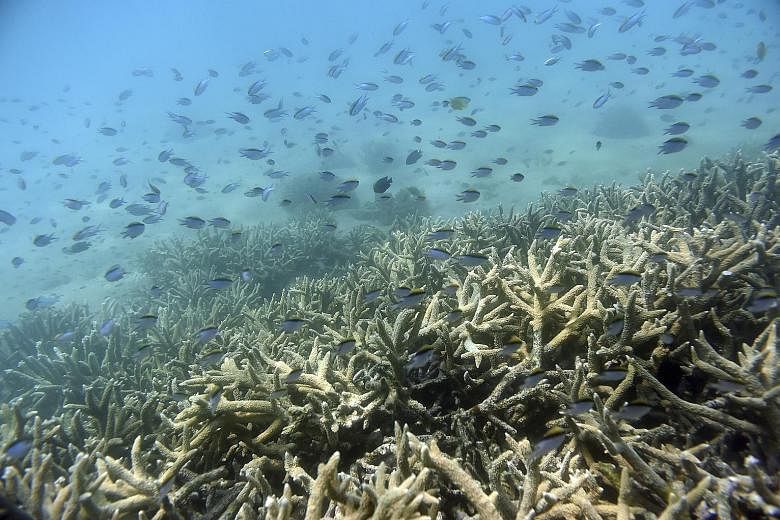SYDNEY • Australia's Great Barrier Reef is in very poor condition because of climate change, overfishing and land clearing, a state agency said yesterday, as it downgraded the reef's status to the lowest level, which could jeopardise its World Heritage status.
The Great Barrier Reef Marine Park Authority (GBRMPA) said the health of the world's largest coral reef system, off the north-east coast of Queensland state, had deteriorated since its last review in 2014, but the problems the reef faces are not insurmountable.
"This report draws attention to the fact that the outlook for the Great Barrier Reef, the long-term outlook, is very poor - that's largely driven by climate change," GBRMPA chief scientist David Wachenfeld told reporters in Sydney.
"Despite that, with the right mix of local actions to improve the resilience of the system and global actions to tackle climate change in the strongest and fastest way possible, we can turn that around."
The report, which is compiled every five years, painted a deteriorating picture of widespread coral bleaching, habitat loss and degradation caused by human-induced climate change, overfishing, poor water quality, and coastal land clearing for grazing.
The reef, stretching for more than 2,300km, is home to 400 types of coral, 1,500 species of fish and 4,000 types of molluscs.
Some parts of the reef remained in good condition but many species - including dolphins, dugongs, sharks, rays and turtles - are being threatened.
Unesco's World Heritage Committee last year called for global action on climate change to protect five large coral reefs, including the Great Barrier Reef.
The committee is due to consider the reef's heritage listing, considering its health and a possible "in danger" status.
"The Great Barrier Reef is one of the globe's most famous World Heritage areas, yet the report finds that its integrity is challenged and deteriorating," environmentalist group Australian Marine Conservation Society said in a statement.
"This is now the third Outlook Report. We've had 10 years of warnings, 10 years of rising greenhouse emissions and 10 years watching the reef heading for a catastrophe," said the group's director of strategy, Ms Imogen Zethoven.
"This report will be a major input into Unesco's committee and here is a very strong case for the reef to be considered for the in-danger list."
The inclusion of the reef on the list would be an embarrassment for the government and could damage the tourist industry.
The conservative Australian government has faced criticism from environmentalists for favouring an expansion of its massive coal mining and export industry over action to curb climate change.
Burning coal is the single largest source of carbon dioxide, the main greenhouse gas that scientists say is heating up the planet and damaging coral reefs globally.
Yesterday's reef report coincided with the release of updated government figures showing that Australia's emissions of greenhouse gases continued a four-year rising trend during the first half of this year.
The government insists that it is meeting its emissions targets as set under international protocols, including the Paris climate agreement, and argues that Australia's total greenhouse gas output remains far below that of major polluting nations.
Environmentalists said that the latest reef outlook puts new pressure on Prime Minister Scott Morrison over his support for expanding production of coal, Australia's biggest export.
Australian Conservation Foundation chief executive officer Kelly O'Shanassy said: "Australia must do its fair share in the global effort to tackle climate pollution.
"That means moving on from digging up and burning coal and gas for our energy."
REUTERS, AGENCE FRANCE-PRESSE

